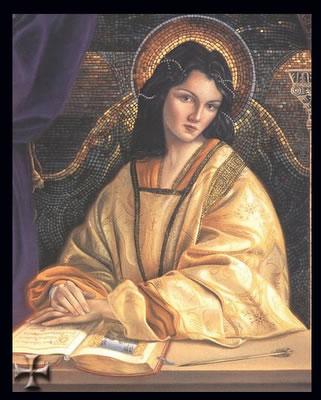 |
| St. Peter Damian, letter writer |
He has a place in philosophy, however, due to one of the 180 letters he wrote. This particular one is called De divina omnipotentia ["Concerning divine omnipotence"]. In it, he discusses two questions that came up in a mealtime conversation during a visit to the Abbey of Monte Cassino.
Before we jump into his answers to the two questions in his letter, we must first bring up the Law on Non-contradiction, which states that a thing cannot be at once true and untrue. Sounds sensible. Aristotle in his Metaphysics states definitively that "contradictory propositions are not true simultaneously." He was building on Plato and Socrates and others.
The two questions that Damian tackles are these:
- Can God restore a woman's virginity?
- Can God undo history?
Does this, then, imply that Damian believes that God can undo history? Not quite. In the case of restoring virginity, Damian states that God can do so as a miracle in the present time. He is not undoing an event that took place; He is changing a person's current state back to an original state.
Then what about history?
Damian, after a long and complicated discussion of the law of non-contradiction (and criticism of his peers for not understanding the subtleties of the question), explains that God cannot turn what has been done into something that has not been done. He denies, however, that this is an instance of a lack of omnipotence. Damian argues that God's omnipotence is His ability to bring about what is good. Creating a contradiction by changing what has been done to something that has not been done would be creating a contradiction, and therefore would be a bad thing. It would be turning something into nothing, and God creates things out of nothing, He will not create nothing out of something.
Okay, fine, but what about evil things? Wouldn't it be good for God to undo evil actions? Damian gets a little vague about this, and tells his audience not to worry about evil things. Evil things don't have the same kind of existence/value as good things, and so to erase them does not create a contradiction in the same way as erasing from the historical record a good thing.
Well, who am I to argue?
*In Canto XXI of the Paradiso, in the Seventh Heaven, a bright soul comes to speak to Dante and identifies himself as Peter Damian. The subject of corrupt popes comes up (surprise!).





























